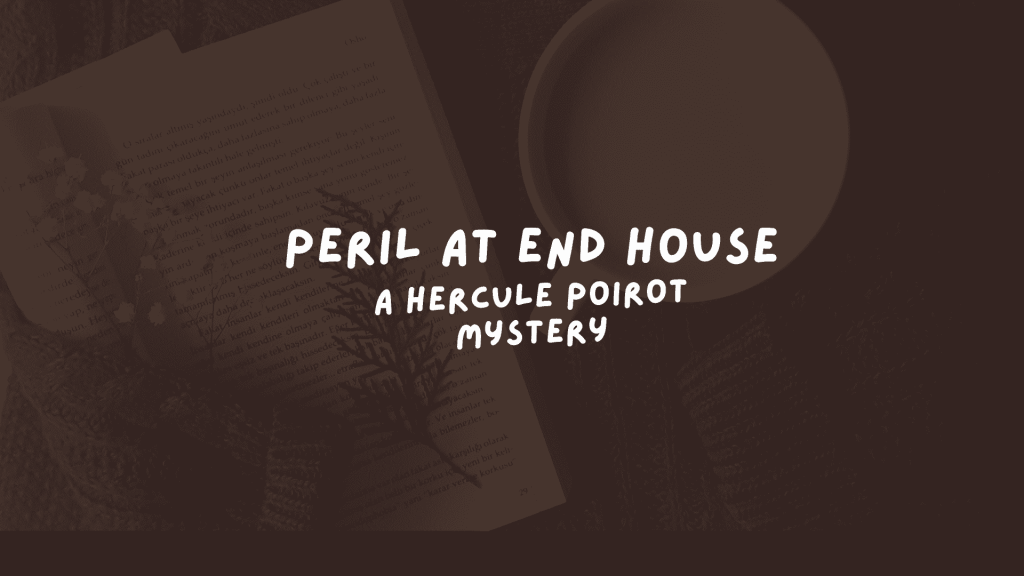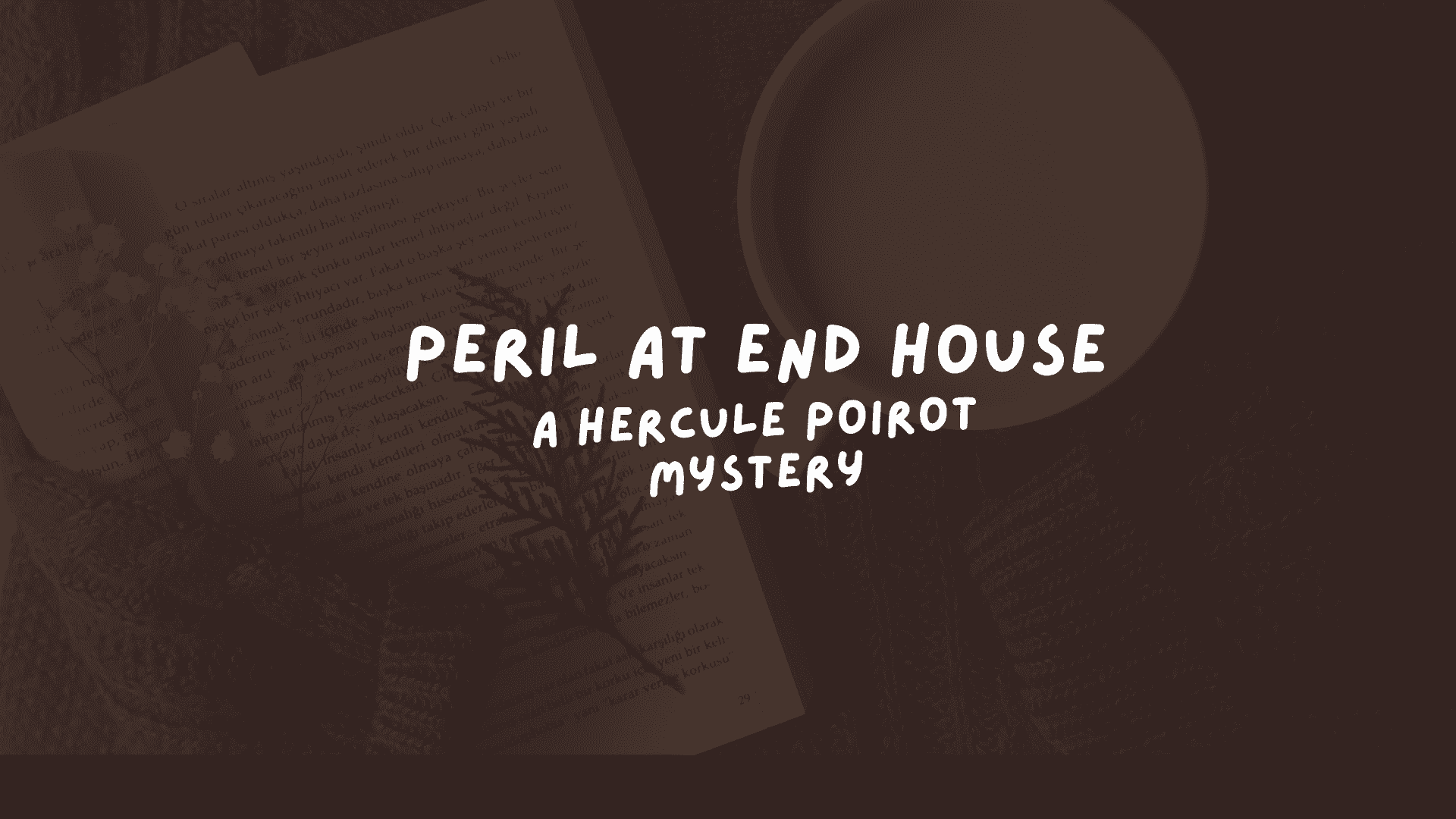Peril at End House Pdf Chapter-12: Ellen Poirot said no word till we had emerged from the nursing home into the outer air. Then he caught me by the arm.
‘You see, Hastings? Do you see? Ah! Sacré Tonnerre! I was right! I was right! Always I knew there was something a lacking-some piece of the puzzle that was not there. And without that missing piece, the whole thing was meaningless.’
His almost despairing triumph was double-Dutch to me. I Could not see that anything very epoch-making had occurred.
‘It was there all the time. And I could not see it. But how should I? To know there is something -that, yes-but to know what that something is. Ah! Ça c’est bien plus difficile.’
‘Do you mean that this has some direct bearing on the crime?’

‘Ma foi, do you not see?’
‘As a matter of fact, I don’t.’
‘Is it possible? Why, it gives us what we have been looking for-the motive-the hidden obscure motive!’ ‘I may be very dense, but I can’t see it. Do you mean jealousy of some kind?’
‘Jealousy? No, no, my friend. The usual motive-the inevitable motive. Money, my friend, money!’
I stared. He went on, speaking more calmly.
‘Listen, mon ami. Just over a week ago Sir Matthew Seton dies. And Sir Matthew Seton was a millionaire-one of the richest men in England.’
‘Yes, but-‘
‘Attendez. One step at a time. He has a nephew whom he idolizes and to whom, we may safely assume, he has left his vast fortune.’
‘But-‘
‘Mais oui-legacies, yes, an endowment to do with his hobby, yes, but the bulk of the money would go to Michael Seton. Last Tuesday, Michael Seton is reported missing-and on Wednesday the attacks on Mademoiselle’s life begin. Supposing, Hastings, that Michael Seton made a will before he started on his flight, and that in that will he left all he had to his fiancée.’
‘That’s pure supposition.’
‘It is supposition-yes. But it must be so. Because, if it is not so, there is no meaning in anything that has happened. It is no paltry inheritance that is at stake. It is an enormous fortune.’
I was silent for some minutes, turning the matter over in my mind. It seemed to me that Poirot was leaping to conclusions in a most reckless manner, and yet I was secretly convinced that he was right. It was his extraordinary flair for being right that influenced me. Yet it seemed to me that there was a good deal to be proved still.
‘But if nobody knew of the engagement,’ I argued.
‘Pah! Somebody did know. For the matter of that, somebody always does know. If they do not know, they guess. Madame Rice suspected. Mademoiselle Nick admitted as much. She may have had means of turning those suspicions into certainties.’
‘How?’
‘Well, for one thing, there must have been letters from Michael Seton to Mademoiselle Nick. They had been engaged for some time. And her best friend could not call that young lady anything but careless. She leaves things here and there, and everywhere. I doubt if she has ever locked up anything in her life. Oh, yes, there would be means of making sure.’
‘And Frederica Rice would know about the will that her friend had made?’
‘Doubtless. Oh, yes, it narrows down now. Do you remember my list-a list of persons numbered from A. to J? It has narrowed down to only two persons. I am dismissing the servants, as well as the Commander Challenger – despite taking an hour and a half to travel the thirty-mile distance from Plymouth – and the long-nosed M. Lazarus who offered fifty pounds for a picture that was only worth twenty (it is odd, that when you come to think of it. Most uncharacteristic of his race). I dismiss the Australians-so hearty and so pleasant. I keep two people on my list still.’
‘One is Frederica Rice,’ I said slowly.
I had a vision of her face, the golden hair, the white fragility of the features.
‘Yes. She is indicated very clearly. However carelessly worded Mademoiselle’s will may have been, she would be plainly indicated as residuary legatee. Apart from End House, everything was to go to her. If Mademoiselle Nick instead of Mademoiselle Maggie had been shot last night, Madame Rice would be a rich woman today.’
‘I can hardly believe it!’
‘You mean that you can hardly believe that a beautiful woman can be a murderess? One often has a little difficulty with members of a jury on that account. But you may be right. There is still another suspect.’
‘Who?’
‘Charles Vyse.’
‘But he only inherits the house.’
‘Yes-but he may not know that. Did he make Mademoiselle’s will for her? I think not. If so, it would be in his keeping, not “knocking around somewhere”, or whatever the phrase was that Mademoiselle used. So, you see, Hastings,it is quite probable that he knows nothing about that will. He may believe that she has never made a will and that, in that case, he will inherit as next of kin.’
‘You know,’ I said, ‘that really seems to me much more probable.’
‘That is your romantic mind, Hastings. The wicked solicitor. A familiar figure in fiction. If as well as being a solicitor he has an impassive face, it makes the matter almost certain. It is true that, in some ways, he is more in the picture than Madame. He would be more likely to know about the pistol and more likely to use one.’
‘And to send the boulder crashing down.’
‘Perhaps. Though, as I have told you, much can be done by leverage. And the fact that the boulder was dislodged at the wrong minute, and consequently missed Mademoiselle, is more suggestive of feminine agency. The idea of tampering with the interior of a car seems masculine in conception-though many women are as good mechanics as men nowadays. On the other hand, there are one or two gaps in the theory against M. Vyse.’
‘Such as?’
‘He is less likely to have known of the engagement than Madame. And there is another point. His action was rather precipitate.’
‘What do you mean?’
‘Well, until last night there was no certitude that Seton was dead. To act rashly, without due assurance, seems very uncharacteristic of the legal mind.’
‘Yes,’ I said. ‘A woman would jump to conclusions.’
‘Exactly. Ce que femme veut, Dieu veut. That is the attitude.’
‘It’s really amazing the way Nick has escaped. It seems almost incredible.’
And suddenly I remembered the tone in Frederica’s voice as she had said: ‘Nick bears a charmed life.’ I shivered a little.
‘Yes,’ said Poirot, thoughtfully. ‘And I can take no credit to myself. Which is humiliating.’
‘Providence,’ I murmured.
‘Ah! mon ami, I would not put on the shoulders of the good God the burden of men’s wrongdoing. You say that in your Sunday morning voice of thankfulness- without reflecting that what you are really saying is that le bon Dieu has killed Miss Maggie Buckley.’
‘Really, Poirot!’
‘Really, my friend! But I will not sit back and say “le bon Dieu has arranged everything, I will not interfere”. Because I am convinced that le bon Dieu created Hercule Poirot for the express purpose of interfering. It is my métier.’
We had been slowly ascending the zigzag path up the cliff. It was at this juncture that we passed through the little gate into the grounds of End House.
‘Pouf!’ said Poirot. ‘That ascent is a steep one. I am hot. My mustaches are limp. Yes, as I was saying just now, I am on the side of the innocent. I am on the side of Mademoiselle Nick because she was attacked. I am on the side of Mademoiselle Maggie because she has been killed.’
‘And you are against Frederica Rice and Charles Vyse.’
‘No, no, Hastings. I keep an open mind. I say only that at the moment one of those two is indicated. Chut!’
We had come out on the strip of lawn by the house, and a man was driving a mowing machine. He had a long, stupid face and lack-luster eyes. Beside him was a small boy of about ten, ugly but intelligent-looking.
It crossed my mind that we had not heard the mowing machine in action, but I presumed that the gardener was not overworking himself. He had probably been resting from his labors, and had sprung into action on hearing our voices approaching.
‘Good morning,’ said Poirot.
‘Good morning, sir.’
‘You are the gardener, I suppose. The husband of Madame who works in the house.’
‘He’s my Dad,’ said the small boy.
‘That’s right, sir,’ said the man. ‘You’ll be the foreign gentleman, I take it, that’s really a detective. Is there any news of the young mistress, sir?’
‘I come from seeing her at the immediate moment. She has passed a satisfactory night.’
‘We’ve had policemen here,’ said the small boy. ‘That’s where the lady was killed. Here by the steps. I see a pig killed once, haven’t I, Dad?’
‘Ah!’ said his father, unemotionally.
‘Dad used to kill pigs when he worked on a farm. Didn’t you, Dad? I saw a pig killed. I liked it.’
‘Young ‘uns like to see pigs killed,’ said the man, as though stating one of the unalterable facts of nature.
‘Shot with a pistol, the lady was,’ continued the boy. ‘She didn’t have her throat cut. No!’
We passed on to the house, and I felt thankful to get away from the ghoulish child.
Poirot entered the drawing room, the windows of which were open, and rang the bell. Ellen, neatly attired in black, came in answer to the bell. She showed no surprise at seeing us.
Poirot explained that we were here by permission of Miss Buckley to make a search of the house.
‘Very good sir.’
‘The police have finished?’
‘They said they had seen everything they wanted, sir. They’ve been about the garden since very early in the morning. I don’t know whether they’ve found anything.’
She was about to leave the room when Poirot stopped her with a question.
‘Were you very surprised last night when you heard Miss Buckley had been shot?’
‘Yes, sir, very surprised. Miss Maggie was a nice young lady, sir. I can’t imagine anyone being so wicked as to want to harm her.’
‘If it had been anyone else, you would not have been so surprised-eh?’
‘I don’t know what you mean, sir?’
‘When I came into the hall last night,’ he said, ‘you asked at once whether anyone had been hurt. Were you expecting anything of the kind?’
She was silent. Her fingers pleated a corner of her apron. She shook her head and murmured: ‘You gentlemen wouldn’t understand.’
‘Yes, yes,’ said Poirot, ‘I would understand. However fantastic what you may say, I would understand.’ She looked at him doubtfully, then seemed to make up her mind to trust him.
‘You see, sir,’ she said, ‘this isn’t a good house.’
I was surprised and a little contemptuous. Poirot, however, seemed to find the remark, not in the least unusual.
‘You mean it is an old house.’
‘Yes, sir, not a good house.’
‘You have been here long?’
‘Six years, sir. But I was here as a girl. In the kitchen as kitchen-maid. That was in the time of old Sir Nicholas. It was the same then.’
Poirot looked at her attentively.
‘In an old house,’ she said, ‘there is sometimes an atmosphere of evil.’
‘That’s it, sir,’ said Ellen, eagerly. ‘Evil. Bad thoughts and bad deeds too. It’s like dry rot in a house, sir, you can’t get it out. It’s a sort of feeling in the air. I always knew something bad would happen in this house, someday.’
‘Well, you have been proved right.’
‘Yes, sir.’
There was a very slight underlying satisfaction in her tone, the satisfaction of one whose gloomy prognostications have been shown to be correct.
‘But you didn’t think it would be Miss Maggie.’
‘No, indeed, I didn’t, sir. Nobody hated her -I’m sure of it.’
It seemed to me that those words were a clue. I expected Poirot to follow it up, but to my surprise, he shifted to quite a different subject.
‘You didn’t hear the shots fired?’
‘I couldn’t have told with the fireworks going on. Very noisy they were.’
‘You weren’t out watching them?’
‘No, I hadn’t finished clearing up dinner.’
‘Was the waiter helping you?’
‘No, sir, he’d gone out into the garden to have a look at the fireworks.’ ‘But you didn’t go.’
‘No, sir.’
‘Why was that?’
‘I wanted to get finished.’
‘You don’t care for fireworks?’
‘Oh, yes, sir, it wasn’t that. But you see, there are two nights of them, and William and I get the evening off tomorrow and go down into the town and see them from there.’
‘I comprehend. And you heard Mademoiselle Maggie asking for her coat and unable to find it?’
‘I heard Miss Nick run upstairs, sir, and Miss Buckley call up from the front hall saying she couldn’t find something and I heard her say, “All right-I’ll take the shawl-“‘
‘Pardon,’ Poirot interrupted. ‘You did not endeavor to search for the coat for her-or get it from the car where it had been left?’
‘I had my work to do, sir.’
‘Quite so-and doubtless neither of the two young ladies asked you because they thought you were out looking at the fireworks?’
‘Yes, sir.’
‘So that, other years, you have been out looking at the fireworks?’
A sudden flush came into her pale cheeks.
‘I don’t know what you mean, sir. We’re always allowed to go out into the garden. If I didn’t feel like it this year, and would rather get on with my work and go to bed, well, that’s my business, I imagine.’ ‘Mais oui. Mais oui. I did not intend to offend you. Why should you not do as you prefer? To make a change, it is pleasant.’
He paused and then added: ‘Now another little matter in which I wonder whether you can help me. This is an old house. Are there, do you know, any secret chambers in it?’
‘Well-there’s a kind of sliding panel in this very room. I remember being shown it as a girl. Only I can’t remember just now where it is. Or was it in the library? I can’t say, I’m sure.’
‘Big enough for a person to hide in?’
‘Oh, no indeed, sir! A little cupboard place-a kind of niche. About a foot square, sir, not more than that.’
‘Oh! that is not what I mean at all.’
The blush rose to her face again.
‘If you think I was hiding anywhere-I wasn’t! I heard Miss Nick run down the stairs and out and I heard her cry out-and I came into the hall to see if-if anything was the matter. And that’s the gospel truth, sir. That’s the gospel truth.’
Read Peril at End House Novel All Parts Free Online
- The Peril at End House By Agatha Christie Novel Complete Review
- Peril at End House Chapter 1: The Majestic Hotel
- Peril at End House Chapter 2: End House
- Peril at End House Novel Chapter-3: Accidents?
- Peril at End House Chapter-4: There Must Be Something!?
- Peril at End House Chapter-5: Mr and Mrs Croft
- Peril at End House Chapter-6: A Call Upon Mr. Vyse
- Peril at End House Pdf Chapter-7: Tragedy
- Peril at End House Pdf Chapter-8: The Fatal Shawl
- Peril at End House Pdf Chapter-9: A. to J.
- Peril at End House Pdf Chapter-10: Nick’s Secret
- Peril at End House Chapter-11: The Motive

